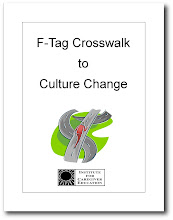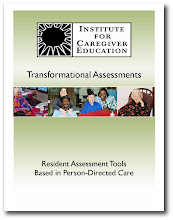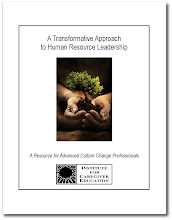Our organization has been fortunate to have had an opportunity to drive some of the system changes taking place in
eldercare that transform communities from a medical model of care to a social model. Included in that
transformation is an effort to move from a traditional "Therapeutic Activities" model to one of "Community Life." I was consulting recently in a home that is undergoing such a change, and I wanted to share some thoughts about the experience w
ith you.
The whole
idea about Community Life focuses on the fact that an organization whose teams are caring for elders has more than just a duty to those that they serve. In fact, such organizations need to focus equally on their residents and their "staff." Community Life is a great example of how a system-change whose goal is to move from a medical to a social model of care can benefit teams and residents EQUALLY.
For example; one of our biggest ideological shifts concerning a traditional Activities model is that rather than serving the largest number of residents at a time (which is most convenient for the staff and
THEIR schedule); i.e. Bingo at 10am and an outside entertainer at 2pm; instead we focus on meeting the needs of the residents on an individual and/or small group basis.
We know that elders don't do as well in large groups. And that is not to say that they might not
occasionally enjoy being in a large group, but rather that every day twice a day in that environment is not usually in their best interest. Nor does it mirror for most of them how they lived their lives prior to coming to the nursing home.
One of the initiatives that we have been advocating for is taking a look at the hobbies/interests/backgrounds of the team members that work in our homes. Sure, in some cases we know how many kids they have, where they might worship, if they have a favorite type of ethnic food, but usually we don't know if they coach a team, know a second language, are an expert woodworker, or if they love reading novels.
Do you see where I am headed with this line of thought?
If we took the time to really get to know the individuals who work in our homes, then we could integrate their talents (the ones OUTSIDE of their traditional work silos) into the LIFE of the home. I'll give you an example.
A home that we work with in Western Massachusetts has a bookkeeper who seldom had a reason to "come out" of her office and interact with the residents. However, when the Community Life (formerly known as the Activities Director) was looking for a combination activity and fundraiser, she thought about the bookkeeper, who happened to be a seasoned seamstress/knitter/crocheter. She asked this individual if she could spare an hour a couple of times a week to instruct residents on different craft projects, that they could later put up for sale. The
Bookkeeper said yes, and from that day forward, the home has had a twice weekly
craft group and an annual craft sale, of which all proceeds benefit the Community Life program.
Whenever I offer that story up during my consultations, I get the same questions:
- Well, who gives the bookkeeper PERMISSION to leave her office twice a week?
- Does she have to CLOCK OUT?
- Is she PAID EXTRA for that time?
I'll answer those questions in the next post!
--Allison Lantieri





